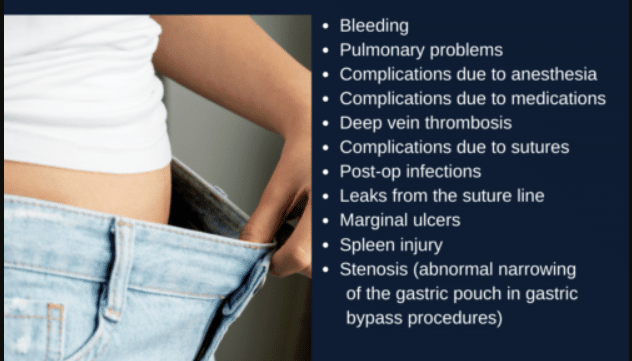Weight loss surgery, often seen as a quick fix for obesity, has grown in popularity over the years. Procedures like gastric bypass and sleeve gastrectomy are commonly sought after for their rapid results in weight reduction. However, beneath these apparent benefits lie hidden dangers that are less frequently discussed. This article delves into the various risks and complications associated with weight loss surgeries, aiming to shed light on aspects that often go unnoticed or under-discussed. From psychological impacts to long-term health complications, it is crucial to understand these risks to make informed decisions about undergoing such significant medical procedures.
The Psychological Impact of Rapid Weight Loss

The drastic change in body image post-surgery can often lead to significant psychological distress. Patients may struggle with the rapid physical changes, leading to feelings of anxiety, depression, or body dysmorphia. Furthermore, the sudden change in lifestyle and dietary habits can be overwhelming, necessitating a strong support system and mental health counseling.
Additionally, there’s a risk of developing an unhealthy relationship with food. Post-surgery dietary restrictions can sometimes lead to eating disorders or an obsession with food and calorie intake. Patients need comprehensive counseling before and after surgery to mitigate these risks and ensure a healthy transition to their new lifestyle.
Nutritional Deficiencies and Health Complications

Weight loss surgeries, by design, limit food intake and can lead to nutritional deficiencies. Patients might suffer from a lack of essential vitamins and minerals, leading to conditions such as anemia, osteoporosis, or even neurological disorders. These deficiencies often require lifelong supplementation and regular medical monitoring.
The alteration in the digestive system can also lead to complications like dumping syndrome, where food moves too quickly through the digestive tract. This condition can result in symptoms like nausea, weakness, and diarrhea, significantly impacting the patient’s quality of life. Therefore, patients must adhere to strict dietary guidelines and undergo regular health checkups to monitor and address these complications.
Risks During and Immediately After Surgery

Every surgical procedure carries inherent risks, and weight loss surgeries are no exception. Patients face potential complications such as infections, adverse reactions to anesthesia, and bleeding. These risks can be exacerbated by the patient’s pre-surgery health status, especially in individuals with severe obesity-related health issues.
There are risks, such as blood clots and pulmonary complications, in the immediate postoperative period. These can be life-threatening and require immediate medical attention. The rate of postoperative complications underscores the need for careful patient selection, thorough pre-surgical counseling, and close postoperative monitoring.
The Problem of Regaining Weight

A significant challenge often unaddressed is the weight potential regain after surgery. Studies show that many patients regain some, if not all, of the weight they lost following surgery. This can be attributed to various factors, including lifestyle choices, psychological aspects, and the body’s natural adaptation to the surgery.
Weight regain not only diminishes the initial success of the surgery but can also lead to feelings of failure and frustration for the patient. It underscores the importance of understanding that surgery is not a one-time solution but rather a tool that needs to be complemented with lifestyle changes and continuous support.
Impact on Digestive System and Gut Health

Weight loss surgery significantly alters the digestive system, impacting gut health and function. Changes in the gut microbiota and a reduction in the surface area for nutrient absorption can lead to gastrointestinal issues such as chronic diarrhea, constipation, and increased susceptibility to ulcers.
Moreover, patients might experience symptoms like acid reflux, indigestion, and vomiting, which can persist long after the surgery. These changes necessitate a lifelong commitment to dietary management and regular medical follow-ups to monitor and address any arising digestive issues.
Financial and Social Implications

The financial burden of weight loss surgery extends beyond the initial procedure. The cost of follow-up treatments, dietary supplements, and potential corrective surgeries can be substantial. Additionally, patients may face financial strain due to time off work for recovery and ongoing medical appointments.
Socially, individuals who undergo weight loss surgery often experience significant changes in their relationships and social interactions. Changing lifestyle and eating habits can affect social gatherings and relationships, sometimes leading to isolation or misunderstanding from friends and family.
Unrealistic Expectations and Quality of Life

There’s a prevalent misconception that weight loss surgery is an easy solution for obesity. However, the reality is far more complex. Patients must make substantial and permanent lifestyle changes, including strict dietary controls and regular exercise. Failure to adhere to these changes can lead to complications and reduced effectiveness of the surgery.
Moreover, while many patients experience an improvement in comorbid conditions like diabetes and hypertension, the overall quality of life improvement is not guaranteed. Mental health struggles, dietary restrictions, and physical changes post-surgery can all impact a patient’s perceived quality of life.
Long-Term Medical Monitoring and Lifestyle Changes

Weight loss surgery is not just a one-time intervention but the beginning of a lifelong commitment to health monitoring and lifestyle changes. Post-surgery patients require continuous medical supervision to manage the long-term effects on their bodies. Regular checkups are crucial to monitor for any complications, such as nutritional deficiencies or changes in metabolic rates. Additionally, ongoing assessments of heart health, bone density, and other vital parameters are essential to ensure overall well-being.
Adapting to a new lifestyle post-surgery is equally important. Patients must adhere to strict dietary guidelines, often involving small, nutrient-rich meals. Regular physical activity becomes a necessary component of daily life. The psychological adjustment to these changes is also significant. Patients must navigate their relationships with food, body image, and self-esteem in new ways. Support groups, counseling, and a strong personal support system can be invaluable in facilitating these adjustments and promoting long-term success after weight loss surgery.
The Bottom Line
Weight loss surgery is not a decision to be taken lightly. It comes with a myriad of hidden dangers, from psychological impacts and nutritional deficiencies to the risk of weight regain and life-altering digestive changes. The financial and social implications further complicate this picture. It is crucial for individuals considering this surgery to engage in thorough discussions with healthcare professionals, understand the long-term commitments required, and consider all possible alternatives. Ultimately, weight loss surgery is a tool, not a cure, and should be approached with cautious optimism and a realistic understanding of its limitations and risks.


